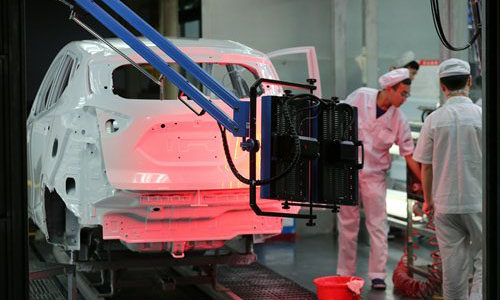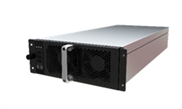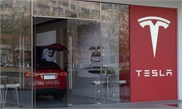SOURCE / INDUSTRIES
Volkswagen investment to boost China's NEV sector: analysts

Employees work at a workshop of Anhui Jianghuai Automobile Co at Hefei, East China's Anhui Province, in July, 2016. File Photo: VCG
German automaker Volkswagen announced plans to invest 2.1 billion euros ($2.31 billion) in two Chinese new energy vehicle (NEV) companies. Analysts said the move would accelerate Volkswagen's China presence and push the domestic NEV industry to a higher level.
Volkswagen will invest 1 billion euros in Anhui Jianghuai Automobile Group (JAC Motors) and another 1.1 billion euros in Guoxuan High-Tech, an electric vehicle battery manufacturer.
Volkswagen said it would claim a 50 percent stake in JAC Motors state-owned parent company, and increase its stake to 75 percent in an existing joint venture with JAC.
An Jin, president of JAC, said China's electric vehicle (EV) industry is at the cutting edge of R&D and application. Both sides plan to promote the EV market and bring more environmentally friendly products to global consumers.
Volkswagen said it would acquire 26.5 percent of Guoxuan High-Tech, becoming its biggest shareholder. Both companies are based in Hefei, East China's Anhui Province.
According to company executives, the German vehicle manufacturer expects to sell 1.5 million NEVs, including battery electric cars, plug-in hybrid, and hydrogen fuel-cell automobiles in the Chinese market in 2025.
Car sales are expected to hit about 35 million units nationwide by 2025, with NEV accounting for 25 percent of the annual figure, roughly 8.75 million units, according to a Chinese government plan.
The moves come after China pledged to advance reform and restructuring on state-owned enterprises. The reform aims to promote mixed ownership and encourage the inflow of foreign capital to foster more world-class, globally competitive companies, said Ji Hua, deputy general manager of Aerospace Engineering Equipment (Suzhou), an China Aerospace and Technology affiliate.
Ji told the Global Times on Sunday that Volkswagen would accelerate its layout in China to capture a market share. It is a good opportunity for the German car giant to acquire stakes at low costs but with big benefits in the post-COVID-19 period.
Volkswagen will bring more benefits for the Chinese NEV market, such as advanced technologies as the Chinese government requires higher levels in this sector, Ji added.
The Chinese NEV industry has shown signs of gradual vitality as the COVID-19 pandemic has been contained and is expected to move toward a prosperous future.
China's Minister of Industry and Information Technology, Miao Wei, said car production in China in April had recovered to last year's level.
The country will pay close attention to developing its NEV sector, expand demand, and promote charging facilities to achieve interconnectivity, Miao said.
NEV subsidy policies will be extended through 2022, according to a document released in April. China also plans to cut NEV subsidies by 10 percent in 2020 year-on-year, 20 percent next year, and 30 percent in 2022.


